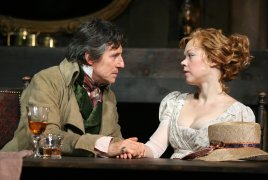
Paulanne Simmons
 |
| Gabriel Byrne, Emily Bergl in Roundabout's "A Touch of the Poet." Photo by Joan Marcus. |
"A Touch of the Poet"
Directed by Doug Hughes
Studio 54
254 West 54th St. between Broadway and Eighth Ave.
Tues. 8 p.m.; Wed. 2, 8 p.m.; Thu, Fri 8 p.m., Sat 2, 8 p.m.; Sun. 2 p.m.
$26.25-$86.25, (212) 719-1300
Reviewed by Paulanne Simmons Dec. 14, 2005
These days so much theater is devoted to the inarticulate that when one sees a play filled with eloquent, even poetic characters, it comes a something of a surprise.
"A Touch of the Poet," now revived at the Roundabout Theatre Company under the direction of Doug Hughes, is the only surviving complete play from a series about an Irish-American family Eugene O'Neill left unfinished at the time of his death. As the name implies, there is much poetry here--from the pen of both O'Neill and the oft-quoted Lord Byron.
Set in the dining room of Cornelius Melody's Tavern, a few miles from Boston in the year 1828, the play is a tale of impossible dreams and the destructive forces let loose when they are crushed under the weight of brutal reality.
Cornelius Melody (Gabriel Byrne) a landed aristocrat in Ireland, cannot reconcile himself to his diminished circumstances in the United States. He takes his anger out on his adoring wife, Nora (Dearbhla Molloy) and their rebellious daughter, Sara (Emily Bergl). While he recites Byron, preens in the mirror and rides his beloved mare, they work as drudges in the tavern trying to make ends meet.
The situation comes to a crisis when Sara falls in love with the son of a wealthy Yankee family and Melody finds out neither the young man's flaky mother (the excellent Kathryn Meisle) nor his father, who sends the family lawyer (John Horton) to the tavern to dissuade Cornelius from encouraging the match, want their daughter associated with the Melody family. Sara, however, is determined to get the man to propose at any cost. Her father is more concerned with preserving his illusions. It is their struggle of wills that unravels the ties that bind the family together.
Hughes has worked very effectively with set and costume designer Santo Loquasto and composer and sound designer David Van Tieghem to re-create the atmosphere of a nineteenth century New England tavern and the spirit of the Irish immigrants who frequent it. But even more, what brings O'Neill's drama to life is the vibrant cast.
In this play, as in much of O'Neill's work, the trick lies in making disagreeable characters sympathetic to the audience. Molloy is powerful and poignant, and gives her submission and suffering dignity not often accorded victimized women.
But how to make Cornelius, an abusive husband and a tyrannical father, into someone with whom the audience can commiserate? O'Neill does this through inspired irony. (When Nora prays for the freedom of Ireland, Cornelius wonders of what benefit that will be "unless she could be free from the Irish") Byrne makes Cornelius human, if not humane, by his uncanny ability to switch directions mid-stream--to metamorphose from overbearing to contrite, from vicious to loving, from defiant to defeated.
A Touch of the Poet moves forward relentlessly and without mercy. No American playwright could better strip his characters of their pretenses and defenses than O'Neill. This stellar cast is obviously comfortable and capable in its handling of the playwright's complex characters. The combination is luminous.

| museums | NYTW mail | recordings | coupons | publications | classified |